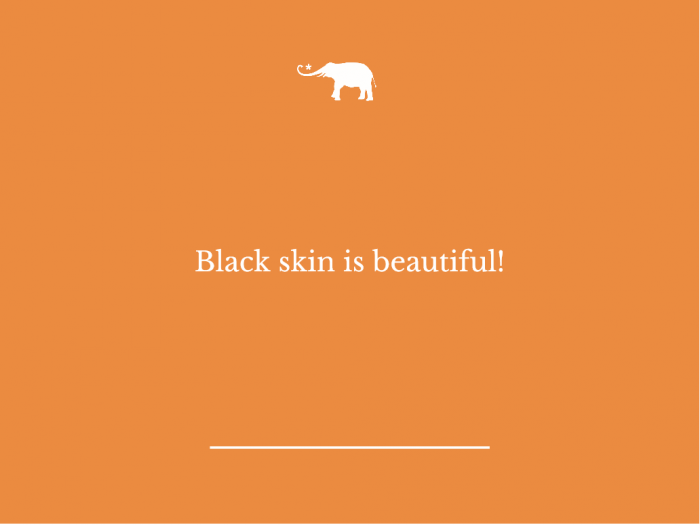Say black people and you are immediately labelled as racist. Say white people and nobody even blinks. To all those anti-racism activists, I hope you do see the double standards and the core of the issue. Because the problem is not with being black or white, but with harboring the belief tacit or not, that black is not beautiful. That black is less worthy and less good, that there is something wrong with black skin. The core of the problem is the white centrism and judging everything from the white culture perspective.
Our societies – especially the western ones, including American – are giving themselves a hard time trying to hide the huge elephant in the room and avoid this truth, searching and inventing new names for races that is not acceptable: Afro-American, Indigenous people etc. (by the way, they are not all black), while denying that actually that:
BLACK SKIN IS BEAUTIFUL!
Black race is strong and resilient because it endured and survived traumas that no other races have ever did. And black skin is loved by the sun because its light and heat does not make it crack within few hours of exposure. This is what my dear African friend – Neema – has been trying to explain to her darker daughter who has been struggling to come to terms with the colour of her skin at the early age of only nine. “Your skin has plenty of melatonin which darkens it but at the same time makes it naturally resistant and strong. You don’t need daily moisturising like I do”. Ever since, little Joyce reminds her mother, proudly “Mom, my skin has …. melatonin!”.
Out casting the words “black people” will not solve anything because when the standard for beauty is white, black is rather at the other end of the spectrum.
Moreover, black or white are relative and false assumptions about skin colour can hit within races themselves. In my own Eastern-European country, with a population of 99, 99 white, I was often “lovingly” called little black girl or little gypsy (and believe me, in rural and very much racist rural Romania, this is not a compliment); just because my skin was slightly darker than that of my siblings. It wasn’t until Neema told me about her niece who got depressed and refuses to go out of the house because people are constantly noticing her darker skin, that I became aware of my own skin colour trauma. And I am a rather white person, no one outside the enlarged family would actually notice my darker skin. Although everyone in the family “noticed” my darker skin with the best intentions, the message entered my mind and my subconscious mind that was less beautiful than my very white shining siblings. And darker meant less worthy of being seen and being listen to and most importantly less deserving of love. In fact, my own family acted very surprised when, at about 12 or 13 years old, someone outside the enlarged family called me “pretty”. My aunt exclaimed loudly, in my presence: “No, no, it’s the older one that is pretty”, (talking obviously about my older sister). “The young one is black”, she continued.
But this article is not about me and my multiple traumas. It is about those seemingly innocent words and concepts – such as darker skin is less good and less beautiful – that can be the source of big trauma for a very young and innocent mind. The very tacit assumption that darker skin is less good than the fairer is a basis for discrimination within and in between races.
While sharing about the skin colour with my Africa friends, I was not surprised to find out that shades and nuances are very much an issue within their culture, but I was surprised to hear that the standard and therefore the beautiful is ….. white. Whiter skin within a black race is more beautiful. Why not darker?
And the bigger problem is that, beyond multiple shades of white and black, we fail to see the humanness and soul of all people, be them white, black, yellow and all the nuances in between. What we fail to see is that we share the same soul, that we love and grieve in the same way, that that same dreams and goals excite us, that the same traumas bruise our hearts.
Next time you interact with a person from a different race or culture, I invite you to search for her or his eyes, search for the human behind the colour, before you judge! And think twice, three times even before you speak or avoid speaking about skin colour in front of a child. Young minds are impressionable, still trying to make sense of this world. It is therefore a high risk of filling in the gaps with negative beliefs about their self.
And please do leave me a comment or get in contact!







Read 0 comments and reply